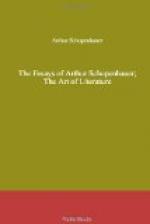With by far the largest number of learned men, knowledge is a means, not an end. That is why they will never achieve any great work; because, to do that, he who pursues knowledge must pursue it as an end, and treat everything else, even existence itself, as only a means. For everything which a man fails to pursue for its own sake is but half-pursued; and true excellence, no matter in what sphere, can be attained only where the work has been produced for its own sake alone, and not as a means to further ends.
And so, too, no one will ever succeed in doing anything really great and original in the way of thought, who does not seek to acquire knowledge for himself, and, making this the immediate object of his studies, decline to trouble himself about the knowledge of others. But the average man of learning studies for the purpose of being able to teach and write. His head is like a stomach and intestines which let the food pass through them undigested. That is just why his teaching and writing is of so little use. For it is not upon undigested refuse that people can be nourished, but solely upon the milk which secretes from the very blood itself.
The wig is the appropriate symbol of the man of learning, pure and simple. It adorns the head with a copious quantity of false hair, in lack of one’s own: just as erudition means endowing it with a great mass of alien thought. This, to be sure, does not clothe the head so well and naturally, nor is it so generally useful, nor so suited for all purposes, nor so firmly rooted; nor when alien thought is used up, can it be immediately replaced by more from the same source, as is the case with that which springs from soil of one’s own. So we find Sterne, in his Tristram Shandy, boldly asserting that an ounce of a man’s own wit is worth a ton of other people’s.
And in fact the most profound erudition is no more akin to genius than a collection of dried plants in like Nature, with its constant flow of new life, ever fresh, ever young, ever changing. There are no two things more opposed than the childish naivete of an ancient author and the learning of his commentator.
Dilettanti, dilettanti! This is the slighting way in which those who pursue any branch of art or learning for the love and enjoyment of the thing,—per il loro diletto, are spoken of by those who have taken it up for the sake of gain, attracted solely by the prospect of money. This contempt of theirs comes from the base belief that no man will seriously devote himself to a subject, unless he is spurred on to it by want, hunger, or else some form of greed. The public is of the same way of thinking; and hence its general respect for professionals and its distrust of dilettanti. But the truth is that the dilettante treats his subject as an end, whereas the professional, pure and simple, treats it merely as a means. He alone will be really in earnest about a matter, who has a direct interest therein, takes to it because he likes it, and pursues it con amore. It is these, and not hirelings, that have always done the greatest work.




